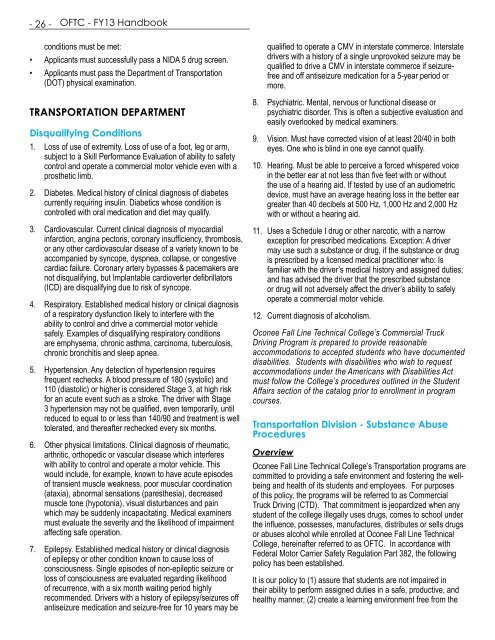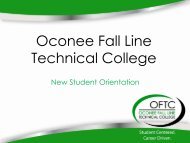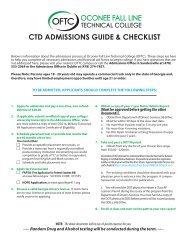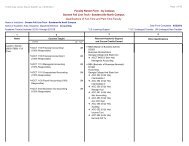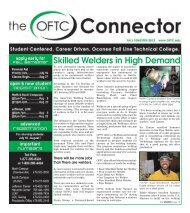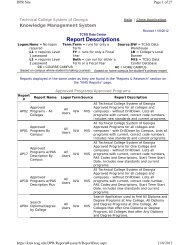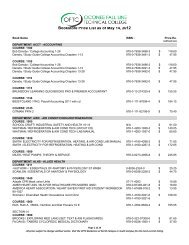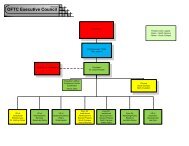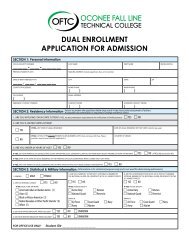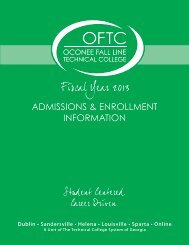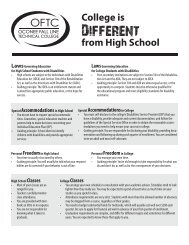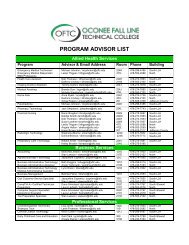OFTC - FY13 Handbook A Unit of the Technical College ... - OFTC.edu
OFTC - FY13 Handbook A Unit of the Technical College ... - OFTC.edu
OFTC - FY13 Handbook A Unit of the Technical College ... - OFTC.edu
Create successful ePaper yourself
Turn your PDF publications into a flip-book with our unique Google optimized e-Paper software.
- 26 - <strong>OFTC</strong> - <strong>FY13</strong> <strong>Handbook</strong><br />
conditions must be met:<br />
• Applicants must successfully pass a NIDA 5 drug screen.<br />
• Applicants must pass <strong>the</strong> Department <strong>of</strong> Transportation<br />
(DOT) physical examination.<br />
Transportation Department<br />
Disqualifying Conditions<br />
1. Loss <strong>of</strong> use <strong>of</strong> extremity. Loss <strong>of</strong> use <strong>of</strong> a foot, leg or arm,<br />
subject to a Skill Performance Evaluation <strong>of</strong> ability to safety<br />
control and operate a commercial motor vehicle even with a<br />
pros<strong>the</strong>tic limb.<br />
2. Diabetes. Medical history <strong>of</strong> clinical diagnosis <strong>of</strong> diabetes<br />
currently requiring insulin. Diabetics whose condition is<br />
controlled with oral medication and diet may qualify.<br />
3. Cardiovascular. Current clinical diagnosis <strong>of</strong> myocardial<br />
infarction, angina pectoris, coronary insufficiency, thrombosis,<br />
or any o<strong>the</strong>r cardiovascular disease <strong>of</strong> a variety known to be<br />
accompanied by syncope, dyspnea, collapse, or congestive<br />
cardiac failure. Coronary artery bypasses & pacemakers are<br />
not disqualifying, but Implantable cardioverter defibrillators<br />
(ICD) are disqualifying due to risk <strong>of</strong> syncope.<br />
4. Respiratory. Established medical history or clinical diagnosis<br />
<strong>of</strong> a respiratory dysfunction likely to interfere with <strong>the</strong><br />
ability to control and drive a commercial motor vehicle<br />
safely. Examples <strong>of</strong> disqualifying respiratory conditions<br />
are emphysema, chronic asthma, carcinoma, tuberculosis,<br />
chronic bronchitis and sleep apnea.<br />
5. Hypertension. Any detection <strong>of</strong> hypertension requires<br />
frequent rechecks. A blood pressure <strong>of</strong> 180 (systolic) and<br />
110 (diastolic) or higher is considered Stage 3, at high risk<br />
for an acute event such as a stroke. The driver with Stage<br />
3 hypertension may not be qualified, even temporarily, until<br />
r<strong>edu</strong>ced to equal to or less than 140/90 and treatment is well<br />
tolerated, and <strong>the</strong>reafter rechecked every six months.<br />
6. O<strong>the</strong>r physical limitations. Clinical diagnosis <strong>of</strong> rheumatic,<br />
arthritic, orthopedic or vascular disease which interferes<br />
with ability to control and operate a motor vehicle. This<br />
would include, for example, known to have acute episodes<br />
<strong>of</strong> transient muscle weakness, poor muscular coordination<br />
(ataxia), abnormal sensations (pares<strong>the</strong>sia), decreased<br />
muscle tone (hypotonia), visual disturbances and pain<br />
which may be suddenly incapacitating. Medical examiners<br />
must evaluate <strong>the</strong> severity and <strong>the</strong> likelihood <strong>of</strong> impairment<br />
affecting safe operation.<br />
7. Epilepsy. Established medical history or clinical diagnosis<br />
<strong>of</strong> epilepsy or o<strong>the</strong>r condition known to cause loss <strong>of</strong><br />
consciousness. Single episodes <strong>of</strong> non-epileptic seizure or<br />
loss <strong>of</strong> consciousness are evaluated regarding likelihood<br />
<strong>of</strong> recurrence, with a six month waiting period highly<br />
recommended. Drivers with a history <strong>of</strong> epilepsy/seizures <strong>of</strong>f<br />
antiseizure medication and seizure-free for 10 years may be<br />
qualified to operate a CMV in interstate commerce. Interstate<br />
drivers with a history <strong>of</strong> a single unprovoked seizure may be<br />
qualified to drive a CMV in interstate commerce if seizurefree<br />
and <strong>of</strong>f antiseizure medication for a 5-year period or<br />
more.<br />
8. Psychiatric. Mental, nervous or functional disease or<br />
psychiatric disorder. This is <strong>of</strong>ten a subjective evaluation and<br />
easily overlooked by medical examiners.<br />
9. Vision. Must have corrected vision <strong>of</strong> at least 20/40 in both<br />
eyes. One who is blind in one eye cannot qualify.<br />
10. Hearing. Must be able to perceive a forced whispered voice<br />
in <strong>the</strong> better ear at not less than five feet with or without<br />
<strong>the</strong> use <strong>of</strong> a hearing aid. If tested by use <strong>of</strong> an audiometric<br />
device, must have an average hearing loss in <strong>the</strong> better ear<br />
greater than 40 decibels at 500 Hz, 1,000 Hz and 2,000 Hz<br />
with or without a hearing aid.<br />
11. Uses a Sch<strong>edu</strong>le I drug or o<strong>the</strong>r narcotic, with a narrow<br />
exception for prescribed medications. Exception: A driver<br />
may use such a substance or drug, if <strong>the</strong> substance or drug<br />
is prescribed by a licensed medical practitioner who: Is<br />
familiar with <strong>the</strong> driver’s medical history and assigned duties;<br />
and has advised <strong>the</strong> driver that <strong>the</strong> prescribed substance<br />
or drug will not adversely affect <strong>the</strong> driver’s ability to safely<br />
operate a commercial motor vehicle.<br />
12. Current diagnosis <strong>of</strong> alcoholism.<br />
Oconee Fall Line <strong>Technical</strong> <strong>College</strong>’s Commercial Truck<br />
Driving Program is prepared to provide reasonable<br />
accommodations to accepted students who have documented<br />
disabilities. Students with disabilities who wish to request<br />
accommodations under <strong>the</strong> Americans with Disabilities Act<br />
must follow <strong>the</strong> <strong>College</strong>’s proc<strong>edu</strong>res outlined in <strong>the</strong> Student<br />
Affairs section <strong>of</strong> <strong>the</strong> catalog prior to enrollment in program<br />
courses.<br />
Transportation Division - Substance Abuse<br />
Proc<strong>edu</strong>res<br />
Overview<br />
Oconee Fall Line <strong>Technical</strong> <strong>College</strong>’s Transportation programs are<br />
committed to providing a safe environment and fostering <strong>the</strong> wellbeing<br />
and health <strong>of</strong> its students and employees. For purposes<br />
<strong>of</strong> this policy, <strong>the</strong> programs will be referred to as Commercial<br />
Truck Driving (CTD). That commitment is jeopardized when any<br />
student <strong>of</strong> <strong>the</strong> college illegally uses drugs, comes to school under<br />
<strong>the</strong> influence, possesses, manufactures, distributes or sells drugs<br />
or abuses alcohol while enrolled at Oconee Fall Line <strong>Technical</strong><br />
<strong>College</strong>, hereinafter referred to as <strong>OFTC</strong>. In accordance with<br />
Federal Motor Carrier Safety Regulation Part 382, <strong>the</strong> following<br />
policy has been established.<br />
It is our policy to (1) assure that students are not impaired in<br />
<strong>the</strong>ir ability to perform assigned duties in a safe, productive, and<br />
healthy manner; (2) create a learning environment free from <strong>the</strong>


